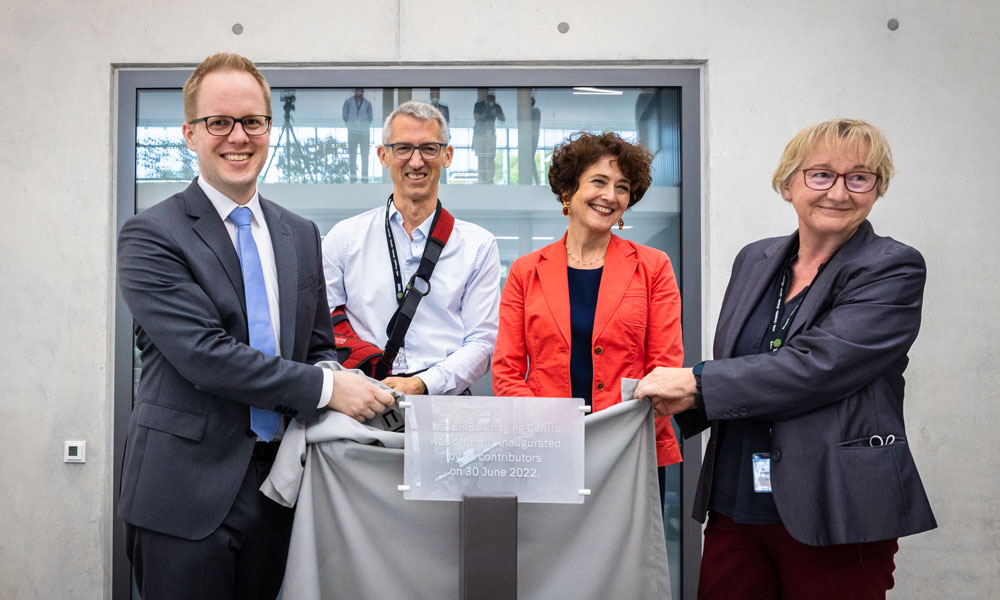Representatives from politics, industry and academia attended the inauguration ceremony at EMBL Heidelberg

The EMBL Imaging Centre provides the global scientific community in academia and industry with access to the latest imaging technologies to enable ground-breaking research. On Thursday, 30 June 2022, the centre was officially opened at the EMBL headquarters in Heidelberg.
Following a welcome address by EMBL Director General Edith Heard, the guests of honour Jens Brandenburg, Parliamentary State Secretary of the Federal Ministry of Education and Research, and Theresia Bauer, Baden-Württemberg Minister of Science, Research and the Arts, officially inaugurated the EMBL Imaging Centre.
Dr Jens Brandenburg, Parliamentary State Secretary, Federal Ministry of Education and Research, said: "The EMBL Imaging Centre offers researchers from all over Europe and beyond access to state-of-the-art electron and light microscopes. We are delighted that EMBL offers this excellent service at its headquarters in Heidelberg. The Federal Ministry of Education and Research is funding the EMBL Imaging Centre to provide groundbreaking new insights into molecular processes. From tumour cells to the impact of the environment - it is here where researchers will investigate the big questions of our time. EMBL is a prominent, globally renowned incubator for new talent. This strengthens the Life Science Cluster in Rhine-Neckar and research in Germany as a whole."
The EMBL Imaging Centre enables researchers from across the world to access some of the latest microscopy technologies. It facilitates research in all areas of the life sciences, and fosters collaboration between research and industry to push the boundaries of the possible in imaging technologies.
"The opening of the EMBL Imaging Centre is an important moment for the European science community. Access to advanced technologies is key to enabling scientific progress," said Professor Heard. "EMBL has pioneered many of the imaging technologies and workflows that scientists apply today, and the EMBL Imaging Centre provides a unique opportunity to benefit from such development."
The building was already completed in summer 2021, within the projected timeframe of two years from having laid the foundation stone. Since then, EMBL scientists began setting up operations, followed by the first visits by scientific users, training provision and the first scientific symposium in May 2022.
By attracting users and visitors to the Rhine-Neckar region, the EMBL Imaging Centre will strengthen the state of Baden-Württemberg as an attractive science and research location.
"Through the Imaging Centre EMBL not only further expands its services, which are already well known far beyond Germany's borders. With its open architecture, it also enables new insight into research itself. For me, the EMBL Imaging Centre embodies cooperation and openness for the future of science in the region, in Germany, and in Europe. Through a public exhibition, this perspective will be broadened, and new ways to involve the public will become possible," said Theresia Bauer, Baden-Württemberg Minister of Science, Research and the Arts.
The EMBL Imaging Centre will also act as a training facility for the latest microscopy technologies. In this way, EMBL's expertise in imaging, from sample preparation to data analysis, can be transferred to global research.
It will additionally provide access to completely new technologies that are not yet commercially available. To enable this, EMBL is working with leading technology developers from academia and industry.
"The open innovation partnership model built between EMBL and its industry partners has successfully led to the creation of this state-of-the-art advanced imaging facility where scientists are enabled and empowered to push scientific boundaries further than ever before," said Fedja Bobanovic, Vice President Global R&D and Chief Technology Officer at Leica Microsystems. "At Leica, we believe innovative public-private collaborations are essential for driving scientific breakthroughs, generating new discoveries, and ultimately improving human health."
The creation of the EMBL Imaging Centre was made possible through generous support from the Federal Ministry of Education and Research (BMBF), the State Ministry of Baden-Württemberg for Sciences, Research and Arts (MWK), and by further contributions from industry partners (Thermo Fisher Scientific, Leica Microsystems and Carl Zeiss Microscopy), as well as by donations from the Boehringer Ingelheim Foundation and HeidelbergCement.






